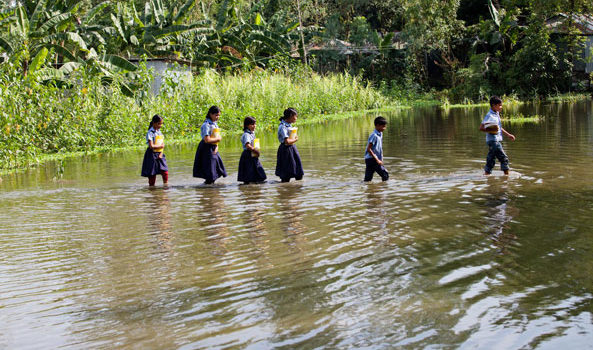“Your Promise, Our Future”: Why Signing the Paris Climate Agreement Matters for Children (April 22, 2015)
Republished from UNICEF
Photo: Students make their way to school after heavy floods in Bogra, Bangladesh. Photo: Unicef/2014/Paul
By Joni Pegram
Today, world leaders will gather in New York to sign the Paris Climate Agreement, the international environmental accord that was finally secured following intense negotiations between every country in the world at COP21 last December. The signing ceremony marks the first step towards ensuring that the Agreement can enter into force as early as possible.
In an historic breakthrough in global efforts to address climate change, every country in the world has pledged their commitment to reduce greenhouse gas emissions and to start adapting to impacts such as rising seas and more extreme weather. Countries have also pledged that the actions they take will respect and promote human rights, including the rights of children and other vulnerable groups such as indigenous peoples and migrants. This commitment goes to the heart of ensuring climate justice for the poorest and most vulnerable children and communities around the world.
There is no doubt that children, particularly those affected by poverty, bear the brunt of climate change impacts, including increasingly frequent and dangerous droughts, flooding, heatwaves and other extreme weather events. From malnutrition and the spread of vector- and water-borne diseases, to physical and psychological trauma during and after severe weather events, children are affected in different ways, and more profoundly, than the population as a whole. These impacts can have life-long and irreversible consequences.
In turn, these impacts further undermine communities’ ability to escape poverty, rolling back precious and hard-won development gains. Yet these vulnerable children and families are too often forgotten when it comes to drawing up the policies, programmes and investments required to tackle climate change. Their voices are not heard in these processes, leading to missed opportunities to capture their perspectives and design policies that address their rights and needs.
We are working hard to address this. When leaders convene for the signing ceremony, they will be greeted by children forming a live #ClimateChain, along with images of hundreds of children from around the world linking hands in a virtual chain, urging them to uphold their commitments.
While signature of the Agreement represents an important political milestone on the road from agreement to implementation, the real litmus test will come with domestic action. Swift ratification must follow by the UK and other Governments – the Paris Agreement will only formally enter into force when at least 55 countries representing at least 55 percent of global emissions ratify it at the domestic level. As global temperatures continue to shatter records, delay is not an option. If the UK Government and other countries are serious about protecting children and future generations from the worst effects of climate change, then they must place their rights at the front and centre of sustainable, low-carbon action, at home and abroad. That will mean clear steps to:
- Urgently ramp up the level of ambition set out in national climate change plans under the Paris Agreement
- Integrate these with efforts to deliver the universal Sustainable Development Goals agreed by all nations in September 2015
- Adopt robust safeguards to ensure that climate change measures do not inadvertently undermine the rights of children that they seek to protect.
Finally, and perhaps most importantly, safeguarding children’s rights will entail a commitment to provide them with the tools and information they require to protect themselves and to participate meaningfully in these decision-making processes.

